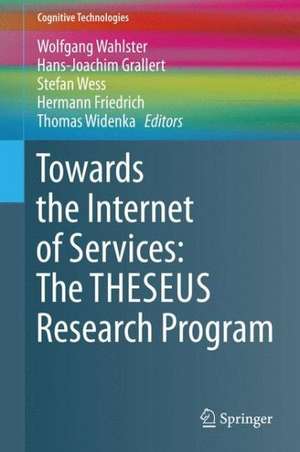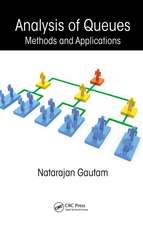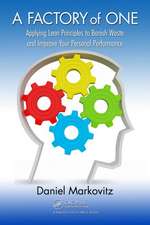Towards the Internet of Services: The THESEUS Research Program: Cognitive Technologies
Editat de Wolfgang Wahlster, Hans-Joachim Grallert, Stefan Wess, Hermann Friedrich, Thomas Widenkaen Limba Engleză Hardback – 11 sep 2014
This book explains the principal achievements of the Theseus research program, one of the central programs in the German government's Digital 2015 initiative and its High-Tech Strategy 2020. The methods, toolsets, and standards for semantic technologies developed during this program form a solid basis for the fourth industrial revolution (Industrie 4.0), the hybrid service economy, and the transformation of big data into useful smart data for the emerging data economy.
The contributing authors are leading scientists and engineers,representing world-class academic and industrial research teams, and the ideas, technologies, and representative use cases they describe in the book derive from results in multidisciplinary fields, such as the Internet of Services; the Semantic Web, and semantic technologies, knowledge management, and search; user interfaces, multimodal interaction, and visualization; machine learning and data mining; and business process support, manufacturing, automation, medical systems, and integrated service engineering.
The book will be of value to both researchers and practitioners in these domains.
| Toate formatele și edițiile | Preț | Express |
|---|---|---|
| Paperback (1) | 342.28 lei 6-8 săpt. | |
| Springer International Publishing – 23 aug 2016 | 342.28 lei 6-8 săpt. | |
| Hardback (1) | 348.72 lei 6-8 săpt. | |
| Springer International Publishing – 11 sep 2014 | 348.72 lei 6-8 săpt. |
Din seria Cognitive Technologies
- 20%
 Preț: 350.98 lei
Preț: 350.98 lei - 15%
 Preț: 649.71 lei
Preț: 649.71 lei - 20%
 Preț: 336.21 lei
Preț: 336.21 lei - 15%
 Preț: 635.47 lei
Preț: 635.47 lei - 20%
 Preț: 650.73 lei
Preț: 650.73 lei - 20%
 Preț: 644.15 lei
Preț: 644.15 lei - 20%
 Preț: 886.14 lei
Preț: 886.14 lei - 20%
 Preț: 331.91 lei
Preț: 331.91 lei -
 Preț: 390.63 lei
Preț: 390.63 lei - 20%
 Preț: 337.11 lei
Preț: 337.11 lei - 20%
 Preț: 1458.56 lei
Preț: 1458.56 lei - 20%
 Preț: 646.80 lei
Preț: 646.80 lei - 20%
 Preț: 994.08 lei
Preț: 994.08 lei - 20%
 Preț: 649.09 lei
Preț: 649.09 lei -
 Preț: 397.38 lei
Preț: 397.38 lei - 20%
 Preț: 988.00 lei
Preț: 988.00 lei - 20%
 Preț: 1009.61 lei
Preț: 1009.61 lei - 20%
 Preț: 597.17 lei
Preț: 597.17 lei - 20%
 Preț: 614.17 lei
Preț: 614.17 lei - 20%
 Preț: 675.51 lei
Preț: 675.51 lei - 20%
 Preț: 994.40 lei
Preț: 994.40 lei - 20%
 Preț: 891.86 lei
Preț: 891.86 lei - 20%
 Preț: 600.41 lei
Preț: 600.41 lei - 20%
 Preț: 533.76 lei
Preț: 533.76 lei - 20%
 Preț: 647.61 lei
Preț: 647.61 lei - 20%
 Preț: 645.14 lei
Preț: 645.14 lei - 20%
 Preț: 512.39 lei
Preț: 512.39 lei - 20%
 Preț: 338.68 lei
Preț: 338.68 lei - 20%
 Preț: 345.22 lei
Preț: 345.22 lei - 20%
 Preț: 668.55 lei
Preț: 668.55 lei -
 Preț: 365.21 lei
Preț: 365.21 lei - 20%
 Preț: 640.51 lei
Preț: 640.51 lei - 20%
 Preț: 1297.17 lei
Preț: 1297.17 lei
Preț: 348.72 lei
Preț vechi: 435.90 lei
-20% Nou
Puncte Express: 523
Preț estimativ în valută:
66.73€ • 69.86$ • 55.21£
66.73€ • 69.86$ • 55.21£
Carte tipărită la comandă
Livrare economică 05-19 aprilie
Preluare comenzi: 021 569.72.76
Specificații
ISBN-13: 9783319067544
ISBN-10: 3319067540
Pagini: 480
Ilustrații: XIV, 480 p. 132 illus., 120 illus. in color.
Dimensiuni: 155 x 235 x 32 mm
Greutate: 0.87 kg
Ediția:2014
Editura: Springer International Publishing
Colecția Springer
Seria Cognitive Technologies
Locul publicării:Cham, Switzerland
ISBN-10: 3319067540
Pagini: 480
Ilustrații: XIV, 480 p. 132 illus., 120 illus. in color.
Dimensiuni: 155 x 235 x 32 mm
Greutate: 0.87 kg
Ediția:2014
Editura: Springer International Publishing
Colecția Springer
Seria Cognitive Technologies
Locul publicării:Cham, Switzerland
Public țintă
ResearchCuprins
Part I – Principal Challenges.- Semantic Technologies for Mass Customization.- Challenges of the Internet of Services.- Industry in the Network of Tomorrow.- New Dimensions in Semantic Knowledge Management.- THESEUS: A Successful First Step. -Part II – Core Technologies.- Core Technologies for the Internet of Services.- Semantic Concept Identification for Images and Videos.- Content Identification and Quality-Based Ranking.- Semantics in Environmental Search Systems. Reasoning Brokerage – New Reasoning Strategies.- A Unified Approach for Semantic-Based Multimodal Interaction.- Building Multimodal Dialog User Interfaces in the Context of the Internet of Services.- Interactive Service Composition and Query.- Intelligent Semantic Mediation, Knowledge Acquisition and User Interaction.- SemaVis – A New Approach for Visualizing Semantic Information.- From Raw Data to Rich Visualization – Combining Visual Search with Data Analysis.- Machine Learning for Visual Concept Recognition and Ranking for Images.- Querying the Web with Statistical Machine Learning.- Automatic Assessment of Image Quality.- Evaluation of Image Annotation Using Amazon Mechanical Turk in ImageCLEF.- Part III – Use Cases.- The THESEUS Use Cases.- Domain-Adaptive Relation Extraction for the Semantic Web.- Ask like an Egyptian – Question Answering in the ALEXANDRIA Use Case.- Print Processing in CONTENTUS – Restoration of Digitized Print Media.- Semantic Linking in CONTENTUS.- Semantic Processing of Medical Data.- Intelligent Healthcare Applications.- Mobile Radiology Interaction and Decision Support Systems of the Future.- Linguistics to Structure Unstructured Information.- High Scalability for Semantic Indexes.- Integration of Semantic Technologies for Business Process Support in the Automation Industry.- Machining Intelligence Network – Data Mining and Semantic Search in the Manufacturing Industry.- Integrated Service Engineering (ISE).- A Unified Description Language for theInternet of Services.- Semantic Technologies for the Internet of Services.- Part IV – Program Organization and Dissemination.- Fostering Innovation with the THESEUS Research Program.- From Idea to Market – The THESEUS Innovation Center for the Internet of Services.
Notă biografică
Wolfgang Wahlster is the Director and CEO of the German Research Center for Artificial Intelligence (DFKI GmbH) and a Professor of Computer Science at Saarland University, Saarbrücken. He was the Scientific Director of the Verbmobil consortium on spontaneous speech translation, the Smart Kom consortium on multimodal dialog systems and the Smart Web consortium on mobile multimodal access to semantic web services. He was awarded the Deutscher Zukunftspreis (German Future Award) in 2001 and he received the Federal Cross of Merit, First Class, the Officer's Cross of the Order of Merit of the Federal Republic of Germany in 2006. He is the Chief Academic Advisor for Information and Communication Technologies (ICT) in the Research Union of the German Government and he is a member or chair of many key international scientific advisory and governance boards and a member of many academies. He has chaired and given invited talks at the key international conferences in computational linguistics and artificial intelligence; he is a board member of the key AI journals; he is a Fellow of the Association for the Advancement of Artificial Intelligence (AAAI), the European Coordinating Committee for Artificial Intelligence (ECCAI) and the Gesellschaft für Informatik (GI) and he received the Donald E. Walker Distinguished Service Award at IJCAI-13, the International Joint Conferences on Artificial Intelligence, in recognition of his substantial contributions, as well as his extensive service to the field of artificial intelligence throughout his career. His research interests include multimodal and perceptive user interfaces, user modeling, embodied conversational agents, semantic web services, semantic product memories and cyber-physical production systems.
Textul de pe ultima copertă
The Internet of Services and the Internet of Things are major building blocks of the Future Internet. The digital enterprise of the future is based not only on mobile, social, and cloud technologies, but also on semantic technologies and the future Internet of Everything. Semantic technologies now enable mass customization for the delivery of goods and services that meet individual customer needs and tastes with near mass production efficiency and reliability. This is creating a competitive advantage in the industrial economy, the service economy, and the emerging data economy, leading to smart products, smart services, and smart data, all adaptable to specific tasks, locations, situations, and contexts of smart spaces. Such technologies allow us to describe, revise, and adapt the characteristics, functions, processes, and usage patterns of customization targets on the basis of machine-understandable content representation that enables automated processing and information sharing between human and software agents.
This book explains the principal achievements of the Theseus research program, one of the central programs in the German government's Digital 2015 initiative and its High-Tech Strategy 2020. The methods, toolsets, and standards for semantic technologies developed during this program form a solid basis for the fourth industrial revolution (Industrie 4.0), the hybrid service economy, and the transformation of big data into useful smart data for the emerging data economy.
The contributing authors are leading scientists and engineers,representing world-class academic and industrial research teams, and the ideas, technologies, and representative use cases they describe in the book derive from results in multidisciplinary fields, such as the Internet of Services; the Semantic Web, and semantic technologies, knowledge management, and search; user interfaces, multimodal interaction, and visualization; machine learning and data mining; and business process support, manufacturing, automation, medical systems, and integrated service engineering.
The book will be of value to both researchers and practitioners in these domains.
This book explains the principal achievements of the Theseus research program, one of the central programs in the German government's Digital 2015 initiative and its High-Tech Strategy 2020. The methods, toolsets, and standards for semantic technologies developed during this program form a solid basis for the fourth industrial revolution (Industrie 4.0), the hybrid service economy, and the transformation of big data into useful smart data for the emerging data economy.
The contributing authors are leading scientists and engineers,representing world-class academic and industrial research teams, and the ideas, technologies, and representative use cases they describe in the book derive from results in multidisciplinary fields, such as the Internet of Services; the Semantic Web, and semantic technologies, knowledge management, and search; user interfaces, multimodal interaction, and visualization; machine learning and data mining; and business process support, manufacturing, automation, medical systems, and integrated service engineering.
The book will be of value to both researchers and practitioners in these domains.
Caracteristici
Authors among the leading scientists and engineers in their fields Explains both foundations and industrial deployments Valuable for researchers and practitioners in artificial intelligence, logistics, engineering and production Includes supplementary material: sn.pub/extras











